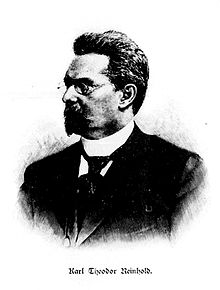Karl Theodor Reinhold
Karl Theodor Reinhold (born May 18, 1849 in Vlotho ; † November 13, 1901 in Berlin ) was a German politician , folk and political scientist .
Life
After attending grammar schools in Gütersloh and Soest , he studied law and philology in Tübingen , Munich , Berlin and Göttingen . He was later a local judge in Barmen and a local judge. He refused the appointment as district court director in Cologne .
From 1886 to 1888 he represented the constituency of Lennep - Solingen in the Prussian House of Representatives . He was also a member of the Reichstag in the seventh electoral term from 1887 . There he represented the constituency of Altena - Iserlohn . He belonged to the national liberal party .
In addition, he wrote political and economic articles and brochures. In 1883 “Das deutsche Volkstum und seine Zukunft” appeared. In 1884 his book "Bismarck als Reformer des Deutschen Geistes" was published. In it he spoke out in favor of state activity to solve the social question . "The distribution on many shoulders, the solidarity of the victims and the help, the tight organization of the scantily allocated aids - that is the specific state idea which alone can save our people, who are powerless in material need and state-ethnographic turmoil." He described the solution to the social question as National Socialism . In 1889 his work "The moving forces of the national economy" appeared.
In 1897 he was appointed associate professor for political science at the University of Berlin . The aim was to push back the influence of the Catholic Socialists. Although he used to belong to the Catholic Socialists himself, he turned away from them. In addition, he was convinced that the Socialists of the Chair would not have pushed back Manchester liberalism in the long run. He warned of the prevalence of individualism and saw society as threatened by the fragmentation of individual interests. Instead, he advocated partnership models.
Karl Theodor Reinhold died in Berlin in 1901 at the age of 52. He was buried in the Kaiser Wilhelm Memorial Cemetery in Charlottenburg (today's district of Berlin-Westend ). The grave has not been preserved.
Individual evidence
- ↑ Bernhard Mann (arrangement) with the assistance of Martin Doerry , Cornelia Rauh , Thomas Kühne: Biographisches Handbuch für das Prussische Abrafenhaus 1867–1918 (= handbooks on the history of parliamentarism and political parties. Volume 3). Droste, Düsseldorf 1988, ISBN 3-7700-5146-7 , pp. 316-317; for the election results see Thomas Kühne: Handbook of elections to the Prussian House of Representatives 1867–1918. Election results, election alliances and election candidates (= handbooks on the history of parliamentarism and political parties. Volume 6). Droste, Düsseldorf 1994, ISBN 3-7700-5182-3 , pp. 718-722.
- ↑ Cornelia Schmitz-Berning: Vocabulary of National Socialism. Berlin 2000, p. 419
- ^ Hans-Jürgen Mende : Lexicon of Berlin burial places . Pharus-Plan, Berlin 2018, ISBN 978-3-86514-206-1 , p. 479.
literature
- Anton Bettelheim (Hrsg.): Biographisches Jahrbuch and German Nekrolog. Volume 6, 1901, Reimer, Berlin
- Hermann Kalkoff (Ed.): National Liberal Parliamentarians 1867–1917 of the Reichstag and the individual state parliaments. Publication distribution center of the National Liberal Party of Germany, Berlin 1917
- Bernhard Mann (arrangement) with the collaboration of Martin Doerry , Cornelia Rauh , Thomas Kühne: Biographisches Handbuch für das Prussische Abrafenhaus 1867–1918 (= handbooks on the history of parliamentarism and political parties. Volume 3). Droste, Düsseldorf 1988, ISBN 3-7700-5146-7 .
- Kurt Koszyk: Gustav Stresemann. Cologne 1989, p. 68f.
Web links
- Karl Theodor Reinhold in the database of members of the Reichstag
- Biography of Karl Theodor Reinhold . In: Heinrich Best : database of the members of the Reichstag of the Empire 1867/71 to 1918 (Biorab - Kaiserreich)
| personal data | |
|---|---|
| SURNAME | Reinhold, Karl Theodor |
| BRIEF DESCRIPTION | German politician (NLP) and political scientist, MdR |
| DATE OF BIRTH | May 18, 1849 |
| PLACE OF BIRTH | Vlotho |
| DATE OF DEATH | November 13, 1901 |
| Place of death | Berlin |
